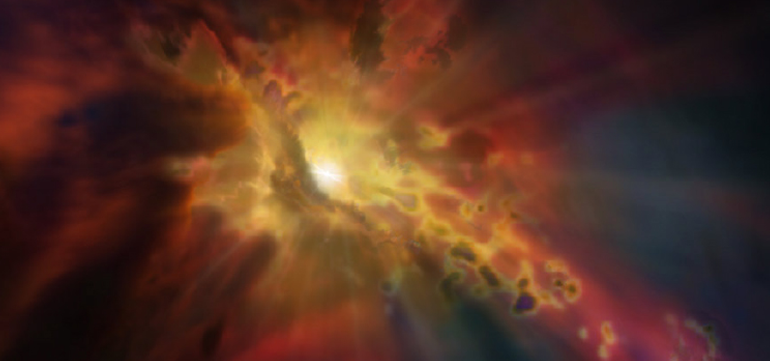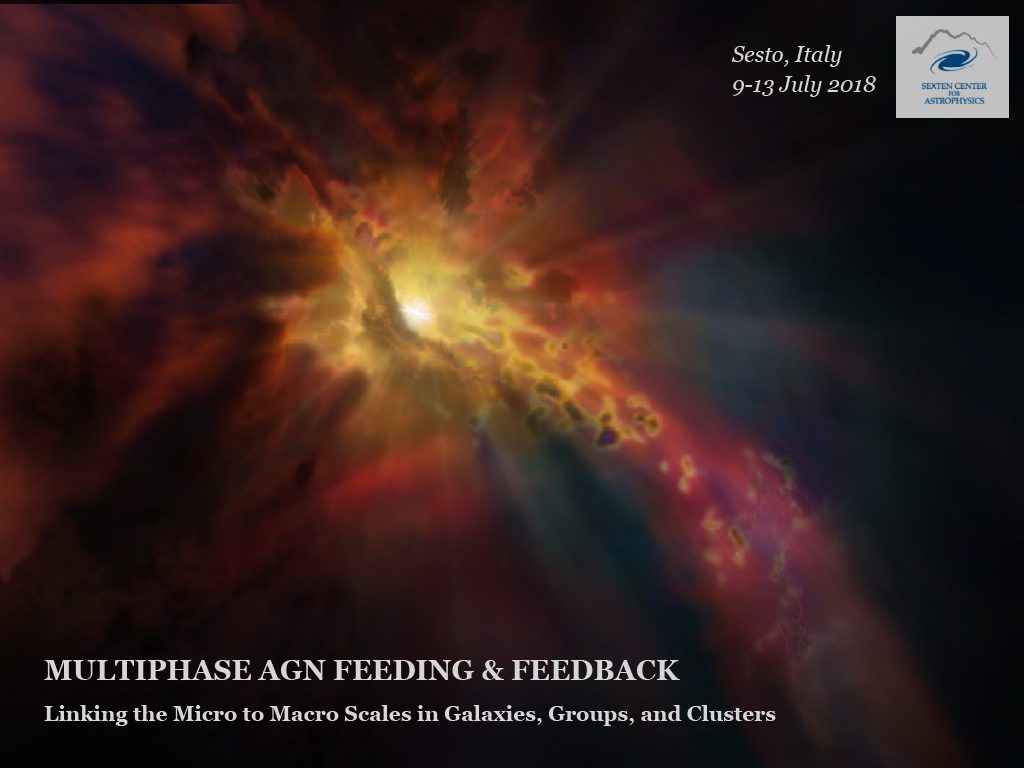
Multiphase AGN Feeding & Feedback
admin0
likes
5,264 views
LOCATION: Sexten Primary School - Via Panorama 6, Sexten
DETAILS
SCIENTIFIC RATIONALE
In the last decade, increasingly strong efforts have been devoted to understand the role of active galactic nuclei (AGN) during the cosmic evolution of galaxies, groups and clusters of galaxies. Chandra, XMM, and Hitomi have unveiled spectacular interactions of the tiny supermassive black hole (SMBH) with the host atmosphere in the form of resolved X-ray cavities, shocks, metal uplifts, and turbulence. At the same time, the hot halos of galaxies, groups, and clusters recurrently condense in localized regions forming multiphase filaments and clouds which rain onto the central SMBH and which are detected by optical/IR/radio telescopes (e.g., Herschel, Magellan, Hubble, and IRAM).
In the nuclear region spectroscopical studies of AGN have discovered an amazing diversity of feeding and feedback phenomena, including ultra-fast outflows, warm absorbers, massive ionized, neutral and molecular outflows. With the advent of next-generation telescopes (e.g., ALMA, JWST, SKA, Athena), we are starting to learn that multiphase outflows may be an ubiquitous phenomenon in cosmic structures of different masses and ages. Linking the macro to micro scales — and vice versa — of feeding and feedback processes is thus crucial to advance our knowledge of the evolution of black holes, galaxies, and clusters of galaxies.
The aim of the workshop is to bring together active researchers in the above tightly related — but often separated — fields in order to discuss the latest results, confront state-of-the-art simulations/models and observations, as well as promote new collaborations and set the path to future observational and numerical campaigns.
GOALS
Specifically, the aim of the workshop is to dissect the following aspects and open issues of AGN feeding and feedback:
– linking the Mpc scale to the pc/Bondi scale to the Schwarzschild radius;
– the mode of accretion onto SMBHs: cold versus hot mode, chaotic vs quenched accretion;
– the formation of multiphase filaments and clouds during the halo evolution;
– the interplay of key physics as a function of time and environment, e.g., MHD, cooling, heating, turbulence, and rotation;
– the amount of energy released by the AGN feedback and the related duty cycle;
– in what form the AGN feeds back the environment, e.g., massive outflows, relativistic jets, and/or radiation;
– linking the multiphase/multiwavelength AGN feedback channels: ionized, neutral, and molecular outflows, and relativistic jets;
– key properties of multiphase outflows: mass loading rates, velocities, entrainment, energy- versus momentum-conserving mode, obscuration, and ionization;
– how, where, and when the AGN energy is deposited, e.g., cavities, shocks, turbulence, and mixing.
RELATED FILES
FEE
Senior € 200,00 ; Students € 120,00
WORKSHOP CODE FOR PAYMENT
ORGANIZERS
ORGANIZERS
Massimo Gaspari (Princeton University, USA) — Chair
Francesco Tombesi (University of Rome, Italy)
Massimo Cappi (INAF-IASF Bologna, Italy)
EMAIL CONTACT
sesto2018agnfeeds@gmail.com
INVITED SPEAKERS/PARTICIPANTS
K. Alatalo | E. Behar | L. Birzan | M. Bourne | M. Brusa | R. Canning | G. Chartas | C. Cicone | F. Combes | M. Crenshaw | M. Dadina | N. Devereux | M. Donahue | A. Edge | S. Ettori | C.-A. Faucher-Giguère | C. Feruglio | F. Fiore | K. Fogarty | K. Fukumura | M. Gitti | K. Hall | S. Hamer | S. Johnson | A. King | S. Kraemer | J. Kriss | S. Laha | K. Lakhchaura | G. Lanzuisi | E. Lau | F. Maccagni | V. Mainieri | M. McDonald | B. McNamara | R. Maiolino | R. Morganti | N. Nesvadba | S. Noble | T. Oosterloo | E. Piconcelli | I. Prandoni | C. S. Reynolds | M. Revalski | T. Rose | J. Sanders | S. Veilleux | C. Vignali | M. Voit | A. Wagner | T. Waters | N. Werner | D. Wittor | D. Wylezalek | H.-Y. Yang | N. Zakamska

